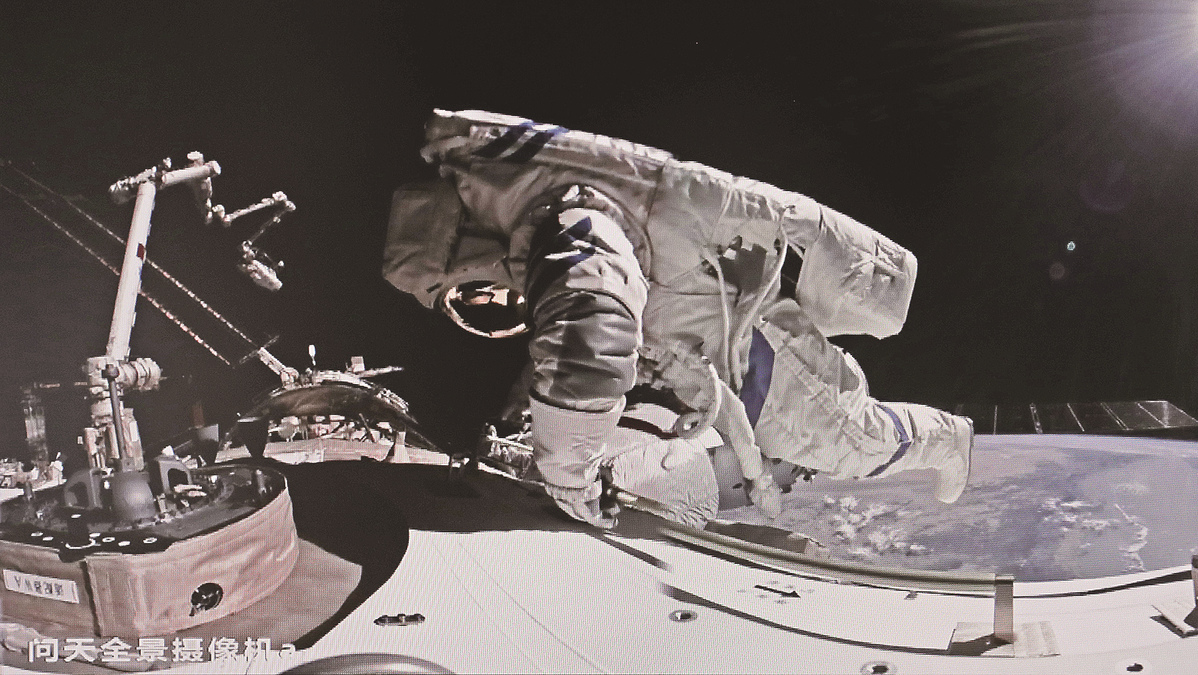Popularization of science key to sci-tech partnership


Children and teenagers in eight African countries, including Algeria, Egypt, Ethiopia, Nigeria, and South Africa, had a one-of-a-kind experience on Sept 6, 2022, as they received, via video link, valuable information on living and working in space from Chinese astronauts.
Answering the children's questions were Chen Dong, Liu Yang and Cai Xuzhe, Shenzhou-14 mission astronauts on board China's Tiangong Space Station. The astronauts responded to the inquisitive African students' questions on living and working in space, covering everything from the types of experiments conducted on board to how to eat and take a shower in micro-gravity.
Smiles and looks of amazement lit up the video conference room at the African Union headquarters in Addis Ababa, Ethiopia, when the Chinese astronauts showed aerial photographs of the Sahara Desert and Mount Kilimanjaro, the highest mountain in Africa, as well as the dazzling display of lights in major African cities at night. The photographs were taken from the windows of the Chinese space station located at an orbital altitude of about 400 kilometers from Earth.
After the event, many of the students said they didn't know the African continent looked so beautiful from outer space. Some even said the interaction with the astronauts had aroused their interest in space technology, adding that they hoped to become astronauts and represent Africa in future space missions.
The entire event was made possible by the 8th Ministerial Conference on the Forum on China-Africa Cooperation held in Dakar, Senegal, in November 2021. The conference adopted the FOCAC Dakar Action Plan (2022-2024) that highlighted the importance of exploring ways to make science popularization a part of China-Africa cooperation on space research to encourage African countries with space exploration potential to achieve their goal.
Science and technology cooperation is crucial for addressing common challenges and building a China-Africa community with a shared future. But to fully harness the power of science and technology to build a bright future, enhancing people's knowledge about science — through science popularization — is just as crucial as promoting sci-tech innovation because it would lay the foundation for nurturing sci-tech talents, facilitating the commercialization of research results, and deepening cooperation in fields such as education, culture and people-to-people exchanges.
That's why China and Africa attach great importance to strengthening cooperation in science popularization. China issued a guideline in September 2022 on how to intensify science popularization in the new era, with special emphasis on strengthening global dialogue and cooperation, and improving scientific culture. Similarly, the African Union's "Science, Technology and Innovation Strategy for Africa 2024" and "Agenda 2063" highlight the importance of science education, building a scientific culture and deepening global cooperation.
Accordingly, the two sides have held several dialogues and deepened cooperation in order to popularize science, especially among children and adolescents.
In November 2023, the Chinese Association of Natural Science Museums, UNESCO and the Rwanda Cultural Heritage Academy signed a tripartite letter of intent to help African countries build natural science museums and other science popularization facilities, and provide science and technology-related services. And in December, the Children and Youth Science Center of the China Association for Science and Technology and the Network of African Science Academies signed a memorandum of understanding to facilitate sci-tech-related people-to-people exchanges, and sharing of science education resources.
Also, the eighth annual Belt and Road Teenager Maker Camp and Teacher Workshop in Kunming, Yunnan province, in July saw the participation of more than 300 students and teachers from 37 countries and regions, many of them from African countries. In the same month, another event saw African teachers and students visiting universities and museums in Shaanxi province to experience firsthand China's latest developments in artificial intelligence and space technology.
On the international front, sci-tech institutes from Africa have consistently supported the World Conference on Science Literacy and the World Organization for Science Literacy, both spearheaded by the CAST in collaboration with dozens of other sci-tech organizations.
Although still in the preparatory stage, the World Organization for Science Literacy has member institutes from Algeria, Kenya, Tanzania, Tunisia, South Africa and Zimbabwe, demonstrating African people's strong desire to deepen China-Africa cooperation on science popularization.
Hopefully, the ongoing FOCAC Summit will help deepen cooperation in science and technology and intensify sci-tech-related cultural exchanges. The two sides should use the framework of the Belt and Road Initiative and the UN's resolution on the "International Decade of Sciences for Sustainable Development" adopted in August 2023 to launch new science popularization activities in areas of mutual interest, such as to combat climate change, conserve biodiversity, increase the share of clean energy in the total energy mix and safeguard food security and use AI for public good.
The two sides should also explore new ways of increasing sci-tech exchanges among children and adolescents, enhancing dialogue, conducting joint research in science literacy evaluation and improvement, sharing educational resources for science popularization, enhancing coordination and collaboration between Chinese and African sci-tech organizations, and jointly contribute to the realization of the UN 2030 Sustainable Development Goals and building a community with a shared future for mankind.
Wang Ting is the director-general of the China Research Institute for Science Popularization; and Zhang Zhihao is the international organization specialist of the institute.
The views don't necessarily represent those of China Daily.
If you have a specific expertise, or would like to share your thought about our stories, then send us your writings at opinion@chinadaily.com.cn, and comment@chinadaily.com.cn.































